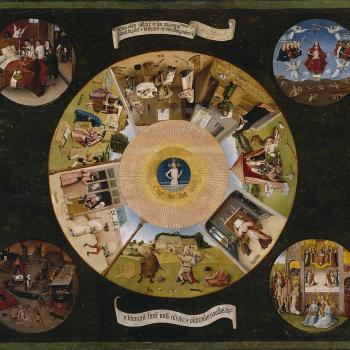
Thanks for joining the conversation. If only you had something to add to it.
That’s interesting. So you want to spend a considerable amount of time (judging from the length of your reply) dealing with someone who in fact has “nothing” to add to the conversation (and commence with an insult). Why in the world should anyone spend time engaging in philosophical discussion with “nothing”? Is not your time more valuable to you than that?
On the other hand, though I may strongly disagree with someone, and even think they are irrational, I see no need to say that they add nothing to a discussion, as if they are not even thoughtful and reflective, whether or not illogically so. That’s how I approach Christian-atheist discussion (obviously unlike yourself). You poison the well from the outset in two serious ways (see my next comment).
Here’s some short answers that most Christians will have trouble with . . . but they do with Christianity.
According to you . . .
One of the greatest issues that Christian apologetics attempts to address is the problem of evil. So, according to leading Christian apologists, it is a very big problem. There are hundreds of books from atheist and Christian alike trying to grapple with the problem. Many Christians have lost their faith because they saw the problem of evil as a nail in the coffin of insane religious belief. It’s fine if you put your blinders on. I don’t mind. Just don’t dismiss me because you think it’s a non-issue.
LOL You prove here, two things:
1) You fail to read comments in context (at least in this instance).
2) You failed to read my recent comments on this very thread, above, which contradict your ridiculous claim, or else read them and have forgotten in a day or two, or didn’t comprehend what I wrote.
Let’s start with #1: first. Let me give the reader your entire comment, without the middle section deleted:
“Here’s some short answers that most Christians will have trouble with. Us atheists need not answer them because they do not contradict with [sic] atheism, but they do with Christianity.”
And so I replied:
“According to you.”
So what is it that I am denying? Quite obviously, I denied that the various dilemmas you propose along the lines of the problem of evil, contradict Christianity. That is how the logic and grammar of your statement (despite its technically incorrect grammar: the proper phrase is “conflict with”, not “contradict with”) and my reply inexorably function.
So I have denied that the problem of evil contradicts Christianity. That is an entirely different proposition from maintaining (as you vainly imagine I did) that I supposedly “think it’s a non-issue.” That’s simply not true (the very opposite of the truth). How many times must I deny this on this blog? I’ve already done it three times now. First I wrote on 6 October 2006, on this blog, replying to John Loftus:
“I think I glanced at your deconversion. Wasn’t the problem of evil key? I consider that the most serious objection to Christianity (though, not, of course, fatal at all, as you’d expect). So while I could still quibble with that, it would be in an entirely different league from the sort of shallow stuff that usually constitutes reasons for deconversions.
“You know how that goes: there are reasons that one disagrees with, while considering them highly respectable and serious and worthy of attention, and others which are downright frivolous and trivial or plainly fallacious.”
Despite that, John cited back to me (on 9 October 2006, in this very same thread; just scroll up) Christian philosopher James F. Sennett:
By far the most important objection to the faith is the so-called problem of evil – the alleged incompatibility between the existence or extent of evil in the world and the existence of God. I tell my philosophy of religion students that, if they are Christians and the problem of evil does not keep them up at night, then they don’t understand it.
I replied: “I agree completely.”
What parts of the words “agree” or “completely” (especially when conjoined) do you not understand? And then I reiterated it in another comment on 9 October 2006; also in this same thread (somewhat disdainfully and sarcastically):
“So being a Christian apologist and having regarded the problem as a very serious and worthy objection for 25 years isn’t sufficient to have any inkling of the depth of the problem.”
So can we put this idiotic portrayal of what I supposedly deny or don’t have a clue about, to rest yet? First John wanted to make out that I was so ignorant that no sensible dialogue was even possible (he has since softened some, but not sufficiently). Then you come along with more sanctimonious, equally irrelevant lectures and say that I don’t think the problem of evil is a problem at all. It’s getting downright goofy in here. One truly wonders if you guys understand the English language or if you think I am simply lying through my teeth when I give you my report of my own long-held opinion.
I just want to have a good dialogue, but it is wrecked by this kind of nonsense and gross misrepresentation of opposing views.
“When earthquakes occur, or children are hacked to pieces, where is your god?”
Being hacked to pieces and slowly murdered on the cross.
What a worthless statement.
Quite the contrary; from the Christian perspective, it has all the worth and relevance to this discussion, in the world. You are critiquing the Christian view, and its supposed internal inconsistencies, so I responded (surprise!) from a Christian perspective. What you think of the cross is perfectly irrelevant to whether my reply is sensible from within my own paradigm that you are critiquing.
Be glib all you want, but some of us are interested in debate – not offhand comments.
It’s not “offhand” in any sense of the word. If you imply that the Christian God cares little about the suffering of His creatures, we reply that He not only does care, but that He is willing to suffer horribly Himself. That is tremendously significant. If you care so much about debate, then why have you begun with three straight insults: all illogical and misguided?
The question at hand is whether God must stop all evil or else cease to exist, or be not-omnipotent, or not all-loving. I deny the atheist negative conclusions about God. But to do so does not imply in the least that a Christian doesn’t struggle with particular acts of evil or minimize them. It just doesn’t add up to a rejection of God and Christianity.
Your god has all the power and incentive to stop earthquakes, but he does not. Either there is an entirely natural explanation of it, or there is some other kind. The natural one is coherent, while the super-duper-natural one is not.
I have given a reply as to natural evil in my thus-far longest paper on the subject (and summarized in some depth in my last installment). I argued precisely from the natural world and what it should plausibly be expected to be like, even if God created and oversees it.
Is it a sign of divine displeasure? What god sanctions an earthquake?
One need not make that equation at all. It doesn’t follow. If God created the natural world and set these processes in motion, which include earthquakes, etc., it doesn’t follow that He approves of every individual instance of suffering as a result of the nature of this natural world, nor that He is obliged to intervene with a miracle in every such case.
The natural world is what it is. Unless the miraculous becomes the status quo at all times (which I think is implausible, and so does the atheist, when not arguing about this topic) with endless miracles, the natural world will entail suffering.
It doesn’t necessarily follow that He should prevent all suffering.
Is he all-good, or not?
He is.
If he’s all-good, he should intervene in every instance.
That doesn’t follow. Nor can it even follow as a logical necessity, given free will, nor does omnipotence itself even necessarily allow God to do so, as Alvin Plantinga decisively proved in his famous Free Will Defense. Philosophers generally no longer claim that the argument either 1) disproves God’s existence or 2) establishes a formal contradiction between the propositions:
A) God is all-good.
B) God is all-powerful.
C) Evil exists.
All you can do, then, logically, in light of this current consensus in philosophy of religion, is to argue that it is improbable or implausible that God would do thus-and-so. But that is a far, far different ballgame. That is weighed down by a host of presuppositions which are all themselves open to serious question and doubt. My primary concern as an apologist (as was Plantinga’s as a theistic philosopher) is to show that the problem of evil does not make Christian belief inexorably self-contradictory or irrational, or (in your charitable, charming terms) “insane.”
Plantinga has already achieved that goal within the realm of the philosophical world, as is generally acknowledged, even by atheists. So I don’t have to (even if I could; of course I would be unable as a non-philosopher). But old atheist habits die hard, don’t they? My concern is not with atheist emotionalism and disdain of God and Christianity, but with logic and rationality. On that score, you guys failed in your attempt to “prove” that God (or an all- good and/or all-powerful God) doesn’t exist because of the problem of evil.
He has the power and will to do so. If he isn’t all-good, then he is nothing more than a brute.
That doesn’t follow, based on the reasoning of Plantinga’s now classic free will defense.
The atheist casually assumes that God should intervene in every tragic situation and use the miraculous to do so, without stopping to consider what this would entail: what sort of weird world (in terms of the natural order) that would require.
You attack the atheist without addressing the issue.
No; I disagree with the atheist by bringing to bear the deeper, more involved aspects of the issue that they fail to address. I always do that. I’m a Socratic (and Socrates was no Christian, last time I checked). I will always question and examine the premises of my opponent and challenge them to consider the deeper implications of their own argumentation.
You can misrepresent my method if you wish, but you’ll just end up looking foolish. Be my guest. I’ve been through this routine with atheists a dozen times: someone on a list or board assumes I am an ignoramus, until a few exchanges, whereupon he changes his tune to avoid further embarrassment. In several cases in past exchanges with atheists, I eventually gained the respect of atheists who started out exactly as you are doing: judgmentally trying to make out that I am a dope with the IQ of a pencil eraser. Fair-minded people can see through that.
Just because you cannot comprehend it, doesn’t mean that your god couldn’t do it.
Even an omnipotent God is subject to limitations insofar as He allows His creatures to truly be free, and therefore potentially counter His will, up to and including evil.
Isn’t that what Christians claim all the time? He can do whatever he want, and “weird world” or not, it makes no difference to him.
Omnipotence means being able to do whatever is logically possible; not anything whatsoever. This is commonly understood by philosophers, and not arguable. God cannot, e.g., make a square circle, or make 2 + 2 = 5, or make Himself not exist, or make you exist and not exist at the same time, or make two brothers both be an only child. Likewise, He cannot create a world where, necessarily, free will precludes evil. And that is true, even given His omnipotence.
I’m agreeing with the theist, then following to the natural conclusion. You just might not like it. He could give us all wings tomorrow, or make the moon talk, or anything else. He can do it, can’t he?
He can do what is logically possible. The moon could conceivably “talk,” I suppose, but not by the laws of nature as we currently understand them. That’s as implausible as (to use a Plantinga example) Henry Kissinger swimming the Atlantic. Is God not omnipotent because Kissinger cannot do that? No; that’s just a limitation of human bodies that follows from physiology.
You haven’t adequately thought through what either free will or omnipotence entail. I don’t say this to insult you (as you repeatedly do to me) but simply as my reply. I appeal to Plantinga, and his much more involved argument.
I plan to present an abridged version of it later today or tomorrow, which I urge anyone to read, due to its high importance in the world of philosophy, regarding this topic. I don’t require you to read a dozen people (as John thinks I must do to intelligently discuss this); I simply recommend reading an abridged version of one highly-significant argument, which I am willing to spend many hours typing up, for your convenience.
I made the point that atheists are extremely reluctant to allow any divine intervention in matters of nature and will despise even theistic evolutionary attempts to do so in any way, shape, or form, yet if we switch over to this discussion on evil, all of a sudden, if God doesn’t do thousands of miracles per second, then He is either bad or not there at all.
Nice blanket label on us atheists.
Is it? I’ve yet to meet an atheist who will argue that it is plausible or logical in the realm of the natural world, for God to constantly, continually intervene with miracles and the supernatural. You disagree? Okay; please direct me to even one such atheist, let alone many, as you make out. If you can’t produce even one, then you have no basis for accusing me of improperly labeling or generalizing in this respect.
Attack the idea, not the person.
That’s precisely what I was doing. The reasoning is as follows:
1. Atheists don’t reason like this (i.e., that God should continually intervene in or contravene natural law) at all, when it comes to the natural world, cosmology, evolutionary discussions, etc.
2. But they want to switch their position and demand that God should do all that (and often, constantly, 1000 times a second), when it comes to discussion of the problem of evil.
Ergo, which is it? Is it plausible to assert a dichotomous hypothetical theistic universe where God can’t or shouldn’t intervene at all in matters of creation or DNA or evolution or intelligent design, whereas He should intervene all the time to prevent every evil imaginable?
I say it is not, and I contend that this is an internal contradiction in the atheist approach to God, when arguing that He doesn’t exist. I doubt that this is an original idea of mine, but I did come up with it without reading it in any philosopher, that I recall. I’d be interested to learn if someone else has made a similar argument.
In any event, it is not attacking people at all. Generalizations based on profoundly repetitive firsthand experience are not “personal attacks” by any stretch of the imagination.
It’s the sin that’s bad, not the sinner. Isn’t that what you’re supposed to say?
Yes it is. I’m the last person to say that atheists are necessarily “bad” people. I’m not a Calvinist (who tend to say that); I’m a Catholic. I’ve written papers (on my website right now) expressly denying that atheists must be bad people just because they are atheists. So you can stop that approach right now. It’ll get nowhere with me. I oppose atheist arguments, not the persons as persons, supposedly wicked and evil, and so forth. I can’t read anyone’s heart or know their motivations. I ain’t God.
I want your god to reveal himself.
Great; that’s a good start.
Let’s hold a thought experiment: your god has said in the NT that he will present evidence to all that asks for it. I do not believe in god, so I ask that in a show of power, your god present himself.
The same God also revealed that He often refuses to give a sign if the purpose is as some sort of “test.” He wants you to have faith in Him without some absolute proof, just as you have “faith” (i.e., assent without absolute proof) in any number of things that you don’t fully understand. So, e.g., Jesus appeared to “Doubting Thomas” after His resurrection, to “prove Himself.” Yet at the same time, He said, “Blessed are those who have not seen, yet believe” (John 20:29). There is more than enough evidence out there to support belief as rational and worthy of allegiance. But God will not be tested in the way that you seem to demand. This is a common biblical motif.
So help me, may I be stricken down by a thunderbolt.
If that’s what it takes, then so be it (provided you survive the experience). God could possibly do that, but He probably won’t, because He wants you to exercise faith without the necessity of oceans parting and people being raised from the dead. We know that some people won’t even be convinced by those miracles, anyway. Unbelief is often stronger than the most obvious miracle.
If we allow your god to tamper with our genes, thus agreeing with ID,
See, this illustrates the internal contradiction in your outlook. Why do you call it “tamper[ing]”, if indeed God does do this (note: I am not asserting that He does or not)? You assume from the outset that He shouldn’t do so; that it is inherently improper. Yet out of the other side of your mouth, when you argue the problem of evil, you want God to change His generally “non-interventionist method” and appear in a great and mighty miracle just so little old you can now believe in Him. Why the difference? Why do you demand the supernatural over here (PoE) and deny it with great vehemence over there (ID, etc.)?
we then must go once again to the problem of evil – namely harmful mutations he has all the power to prevent.
I see; so in He intervenes positively in creative acts or supervision, He is “tampering,” but if He doesn’t prevent a mutation, this proves His character as immediately suspect and not good. The universe as I construe it is far more plausible, I think: God usually doesn’t directly intervene. He created the universe and the presence of free will in sentient creatures, within it. Sometimes He intervenes with the miraculous, but this is a rare exception to the rule. This applies both to the “spiritual” realm (people having a religious conversion, remarkable answered prayer such as a healing, etc.), and to the natural world. But your (and the general atheist) position involves an irrational dichotomy that I find utterly implausible.
If he is messing around with our genes,
See the improper value judgment again?: “messing around”? Why is that such a bad thing, if God chose to do that? If indeed He is the Creator, why is it so implausible that He could supervise His creation in some fashion? I don’t have this all worked out; my own views on creation are in flux and I am actually an agnostic as to actual process. But every Christian believes that God is creator and that He is inexorably “in” all creation in some sense, whether He chose to use evolution as His usual method or direct creation, in some instances. What all Christians deny is that God should be utterly separated from the natural world. We deny scientific materialism. Methodological naturalism is fine in the laboratory and at the theoretical level, but not philosophically.
he must be directly responsible for, or at least doesn’t mind, every single child born with a genetic disorder.
The natural world is as it is. If we didn’t have order in it, including calamities, then it would be a chaotic world that would make no sense, and arguably (per, e.g., C. S. Lewis, in his classic work, The Problem of Pain), even free will would be impossible. We would all be completely determined in our actions. Evil might be precluded in such a world, but good also would be, and that is the central issue: What is God willing to allow in order to bring about the possibility of good and love and virtue and the freedom that is necessary for all to exist? What is it that even He cannot prevent, in a universe with true freedom of action?
In fact, I argue consistently for your god to present himself. No god has taken me up on the challenge yet. Perhaps if you pray hard enough, he might pop in for a chat.
Chances are, He won’t, because of your manifest attitude of extreme skepticism, and borderline mockery. That is not how God, according to the Bible and Christian experience and thought, operates. There are always exceptions, but I wouldn’t expect that to occur at all.
I make the argument (too involved to briefly summarize) that there is, therefore, some necessity for the world being the way it is, and that God is bound to the laws of logic, insofar as natural disaster and natural evil occurs.
How is preventing a natural disaster breaking a law of logic?
It doesn’t necessarily break any law of logic. God could intervene whenever He chose to do so. We believe He has in fact on occasion done so. What I am denying is the claim that He must do so, and in virtually all such scenarios, or else the conclusion musty be (so we are told) that He is bad or weak or not there. You simply have not proven that these things hold true. I have tried to make an argument that there is some (to us, mysterious) sense of the natural world having to be the way it is, and thus entailing suffering, by its very nature. God can then make great good come from suffering, in many different ways.
Your god can do whatever he wants, right?
Whatever is logically possible, as far as that goes. That doesn’t mean He has to do whatever is possible, as if He were determined in His actions, also. Nor does it mean that He is bound to our paltry human considerations of what He must do or not do. Clearly, an omniscient, eternal Being is so vastly different from what we are that it is pretty foolish for us to try to second-guess what this Being should or shouldn’t do. Christians believe on many grounds that He is a benevolent Being. The problem of evil, difficult though it is, doesn’t cause us to doubt that, because we have many other evidences, suggesting He is good.
The presence of free will makes it possible that it will be abused, yes. We believe that God thought it better to allow free will and the evil that can result, rather than make robots who can do no other than what they do. God made it possible for you to be so free that He even allows you to believe foolish things like denying that He exists. That’s extremely tolerant, isn’t it? It would be like me saying, “hey, you can believe whatever you want, even that I don’t exist.”
And for questioning something, I am deserving of hellfire.
Who said that? No intelligent Christian that I know of. You’ll be judged based on what you know, not what you don’t know. If you know there is a God and reject Him, you will end up in hell by default, as your own choice. If you truly don’t know that He exists, and God decides that the conditions and environments that you moved in were sufficiently problematic, so that you had warrant for your disbelief from your own limited perspective, then there is hope that you can be saved trough ignorance and due to mitigating circumstances. That is why it is heartening to me to see a great deal of ignorance and irrationality in atheist circles. That gives me hope that many of you will be saved.
I don’t see sheer rebellion as much as profound disinformation and lack of knowledge and wisdom. And I see the attitudes that I run across myself, as a Christian apologist. If an atheist approaches an apologist, who represents the Christian faith, in an arrogant or mocking manner, chances are, that is how he approaches God, or the philosophical questions surrounding God, too. He is not seriously considering the Christian argument. But if that is not the case, I would argue (abstractly, from a purely philosophical perspective, momentarily putting myself in your shoes), that he shouldn’t bother at all with Christians or God, and simply go about his life and his business, doing his thing, whatever it is, free and full of bliss.
Yet you guys are here arguing with Christians all the time. If you didn’t have the slightest suspicion that we may be right and you wrong, then rationally-speaking, you shouldn’t bother with us at all. This blog shouldn’t exist. But it does. And people like you spend time answering ignoramuses like me. Why? There is something there; some remote glimpse or flicker of a possible world where God exists, with all that flows from that.
Pretty tolerant, ain’t it?
I have shown that your caricature of how someone may wind up in hell does not accurately portray either God as we know Him or the Christian position.
Why would an all-good god want me to burn in hell?
He doesn’t. I deny your premise.
He should know exactly what would turn me to theism, or the clutches of Christianity.
He does. How do you know that it won’t take many many years? God knows everything. He knows what would convert you, and you will have an adequate chance to believe or reject Him. It may take some tragedy 30 years from now that will break through your non-belief. There are millions of possibilities. But it is irrational to require Him to appear RIGHT NOW so that you can believe in Him. That’s an utterly simplistic view of the universe, not a thoughtful, reflective, adult approach to the possibility of theism and/or Christianity.
All I ask for is the evidence to save my soul. You should be jumping at this opportunity.
I am. I’m here arguing. Whether I do so to your satisfaction is not my concern (just as whether God does what He does to your satisfaction is any of His concern: how could He possibly please five billion people and however many millions of atheists there are, with all your irrational demands?). You can decide to continue with me if you see some spark of truth or possible, potential truth in what I say, or not. But in any event, I am not the one who would convert you; that is God’s job, and involves your free will. I can’t change that; only He can and you can, in the end. I’m just here making my arguments, and I have tons of material on my blog and website, if you or anyone else is interested.
[C.S. Lewis] “All matter in the neighbourhood of a wicked man would be liable to undergo unpredictable alterations. That God can and does, on occasions, modify the behaviour of matter and produce what we call miracles, is part of the Christian faith; but the very conception of a common, and therefore, stable, world, demands that these occasions should be extremely rare . . .”
Why should they be rare?
Why should God’s intervention in creation itself be rare or nonexistent? Why is this opposed at every turn in discussions of evolution or ID? Why is it disallowed? Clearly, because some theory or grand outlook has precluded it. That’s exactly what we are asserting here: we claim that it is sensible for God to allow the natural world to be what it is, without intervening at every turn.
The existence of a god would neither dictate that miracles would occur quite frequently or once a blue moon.
That’s right. But you in effect irrationally demand both scenarios simultaneously; that’s what I am driving at. It’s one way to turn the tables on the problem of evil argument. “The problem of good” is another. I’ve done both.
He obviously thought differently, and He (being omniscient) knows better than we do, why the world is the way it is. This was essentially the perspective of the Book of Job. It makes a lot of sense, if one presupposes for the sake of argument, the theistic God. If He does exist and is all-knowing, then who are we to try to second-guess Him, no matter how perplexing we may think the world is?
Oh, so I shouldn’t ask questions. Ok.
To say that we shouldn’t second-guess God is quite different from saying we shouldn’t question or have any doubts and questions at all. This is what Job is driving at. It is the tomfoolery of a creature who knows that God is Who He is, questioning all these things, from a position of vast, incomprehensible intellectual inferiority. It’s like a two-year-old questioning Einstein.
Now, again, this doesn’t preclude any agony or thought or befuddlement on our part. It presupposes it and goes on to a deeper level. The point of Job was not that Job shouldn’t suffer and wonder what the hell was going on. Quite the opposite: God assumed that as perfectly natural, but objected to Job using his suffering (however profound, and it was) to cause him to “curse God and die” (as his wife and friends: the proverbial “Job’s comforters” – suggested).
In other words, the problem of evil is not great enough to warrant disbelieving in God, or even believing that He doesn’t have some greater purpose in mind, that we simply can’t comprehend. That is the specific meaning behind my comment about “second-guessing.” The Book of Job deals with this question in a dramatic, narrative, pre-philosophical and pre-scientific fashion. Alvin Plantinga disposed of it with brilliant philosophical method. Two ways to skin a cat . . .
Wait a minute! I couldn’t help but wonder why your god is correct, and the Islamic god is wrong.
That involves a ton of apologetics, and is, of course, far beyond our purview here.
If I was to presume “the theistic god”, I can only conclude that the world is the way it is because a deity said so. Nothing more.
Not if free will is taken into account.
I hope I haven’t fallen out of your favor by thinking. I guess I shouldn’t ask questions.
If you ask them, I’ll answer them to the best of my ability. I won’t mock and belittle you, as you do me. That’s quite Christian: endure mockery and insult and continue to try to act in a considerate, loving fashion by providing some halfway decent answers from a Christian perspective. By God’s grace (it sure ain’t in my own power), may I always do so.
The Bible tells us that anyone we meet is like encountering Jesus Himself (“if you do it [provide charity or aid, etc.] to the least of these, you do it to me”). Mother Teresa had a funny saying (recounted by Malcolm Muggeridge): if someone perturbed and annoyed her, she would call them “Jesus in rather distressing disguise.” That’s how you are! God teaches me patience and longsuffering in dealing with mocking types like you. But you won’t stop me. Do you think you are the first atheist who has dealt with me in this manner? You ain’t the first and you won’t be the last. It has no bearing on how I reply. I’m here to communicate Christian truth, as I understand and believe it in faith, in complete harmony with reason.
He allows the evil to happen for a higher purpose (often so high we cannot comprehend it). He was certainly behind the crucifixion. That had the utmost purpose, even though the thing itself was horrendous evil. God (the Father) took it and made it the means for the salvation of mankind. He used the intended evil for good.
So where’s the free will for the Roman soldiers?
They acted freely in ignorance. How were they to know what they were doing? They were just following orders.
Is your god guiding them along like actors in a play?
He allowed the evil as He often does. In this instance, He brought about a tremendous good as a result of evil intentions (of those responsible for murdering – unjustly executing – Jesus).
He was, after all, “certainly behind the crucifixion.”
In the sense of allowing the evil for His greater purposes, but not direct causation.
You seem to be unable to comprehend how a theistic world could contain suffering or that much suffering could be the result of 1) natural laws of nature . . .
If your god is all-powerful, he could change the laws of nature.
He could. And He could also make them exactly as they are. I don’t see how the laws of nature somehow disprove God’s goodness because people sometimes get harmed by them.
He could make gravity less to stop a fall. He’s performed miracles, stopped the sun in the sky, and raised the dead. He can do all these things, but he can’t stop a rape?
He could do lots of things. But because of free will, lots of bad things become possible.
The child that gets run over by a speeding car had a purpose in being violently crushed to death under the wheel of a hummer? I think not.
In and of itself, it does appear meaningless, senseless, and outrageous, I admit. It certainly is in atheism, because this life is all there is. But when there is an eternal life ahead of us, tragic events like this are not the be-all and end-all.
You have just devalued the child’s life.
I don’t see how. I simply said that there can be a greater meaning in even the most horrible things, and that the child has eternal life. The child’s existence didn’t end then, as in atheism. Imagine the senseless slaughter of abortion from an atheist perspective: now the child is not only deprived of an eternal life (because there is none), but even of this life, which is all he or she had. And this is thought to be perfectly rational, moral behavior.
Alexander Solzhenitsyn is thankful to God for his time spent in the Gulag because it brought him to God. Corrie Ten Boom’s sister (I forget her name) felt the same in the Nazi concentration camps: that they had a purpose (or that God could use these horrors in some fashion), however incomprehensible to us. So did Corrie (that was the subject of a movie, The Hiding Place). They didn’t blame God for that. Why should they? Men did those horrors, not God.
That is horrible to do so.
Yeah, it would be, but I didn’t do it. What is horrible is for you to imply that I did.
Life is meaningless to a Christian.
Is that so? You could have fooled me.
All that matters, as you say, is “an eternal life ahead of us”.
I didn’t say that was all that mattered. I wrote, rather: “when there is an eternal life ahead of us, tragic events like this are not the be-all and end-all.” No Christian can disagree with that. Not even an atheist could disagree. All you have to do is change the initial “when” to “if” and you must agree to this, even as an atheist. It is a point about perspective.
But to make that point has nothing to do with how valuable this life is or isn’t; only to note that the perspective on the evil event shortening that poor child’s life can be seen in a profoundly different light, when one believes that it is not the “end” of the child altogether.
So, nice try to caricature and twist what I said into some idiotic, stereotypical “pie-in-the-sky” scenario. It is not at all, and if you were thinking sensibly in interacting with me and accurately portraying what I argue, you would see that without it having to be pointed out to you.
You have devalued existence.
Right. Of course I did no such thing. But nice try.
Now that is depressing. As you point out, “It certainly is in atheism, because this life is all there is.” Wouldn’t this make life much more important?
In the sense of it being all there is, yes. So, then, why do most atheists think abortion is fine and dandy? You may claim (on illogical, unscientific grounds) that the baby slaughtered is not yet a person or a human being, but you can’t deny that it WILL be, if just given enough time. So you have still deprived it of the only life it would ever have, in your viewpoint. This is as monstrous an evil as I can imagine, and it is undertaken by torture and murder of the most defenseless creature.
We have only one life to live, so we try to help others because it helps, not because it gets you into heaven.
That’s what we do, too, thank you. Because God is good, He will reward us in heaven one day, but our motivation is to love others and show them the way to God so they can get to heaven one day too. It’s illogical, of course, to argue that the Christian can only be motivated by heavenly rewards, simply because we believe in heaven. You have not proven that in the least. You simply assert it, because it is one of those old saws that play real well in atheist circles. But I’m not interested in empty rhetoric; I am interested in reason.
The Christian is selfish and cares only about the imaginary life after while the atheist cares about this life and others.
See my previous comment.
God can even use such horrors to bring about good.
So your god can direct the actions of the parents, but can not prevent the ball from bouncing into the middle of the street? Pretty bizarre.
I appeal back to my argument from the regularity of nature and the implausibility of the opposite state of affairs.
And that can be a witness which can bring about the salvation of many, which would be a wonderful thing brought about by the bad, hence giving it meaning it would not have by itself.
To give the death of a child run over by a car ‘meaning’ is a despicable act.
Not at all. I’m not saying that the thing is good in and of itself, or even meaningful from our human perspective. Heavens no. I’m trying to look at it unemotionally from the standpoint of reason and philosophy (something you seem unable or unwilling to do, due to the highly emotionally-charged nature of the topic, that bothers everyone). To say that God can use some unspeakable horror and bring some good out of it is not to devalue the victim of the horror in the least.
The worst act can be cast aside for a positive meaning.
Who’s casting aside?
You have just made the death of a child worthless.
Not at all. You are the one doing that, because in your world, such a horrific tragedy has no conceivable purpose. There is no eternal life. The child was just deprived of the only life it had. There is no way to balance the scales of unjust happenings and make it better for the child in another world. There is no God to bring anything at all good from it. Those things are what make the act senseless and the child’s life senseless, not Christian belief. You are in the world of nihilism, not I.
These things should make you tremble and be baffled and perplexed and disturbed far more than the problem of evil troubles Christians, because we have faith in a loving, omniscient God and accept that there are lots and lots of things we don’t know, with our severe limitations as finite creatures. You can lie about our perspective on these things if you wish but it won’t solve your existential problem or prevent the despair you ought to be in if you really, truly contemplated the ultimately meaningless world that your position entails.
Is the death of a fetus good because the mother may grow up to witness to others, which can bring about the salvation of many, which would be a wonderful thing brought about the bad, hence giving it meaning it would not have by itself?
The act itself remains evil. Do you support legal abortion? God can use it, as He does any evil. The mother involved (and pro-lifers generally don’t find the mothers responsible, but rather, the doctors, and those who “persuade” her to do this terrible act) may later give testimony that this choice was wrong, and help women to not have an abortion, or talk about the side effects which are ignored, etc. So good could come out of that.
If a child’s death is permissible, so is abortion.
Abortion is the willful taking of an innocent human life. It’s murder. An accident with a car is not that. Apples and oranges.
Any action is permissible.
In atheism consistently thought through, yes.
Bill Donohue said that the tsunami disaster in Southeast Asia was the “poor Asian people[‘s] gift to the world,” so it mustn’t have been that bad.
I’d have to see the context of his remarks. Seeing how you have repeatedly run roughshod over the context of my own remarks, I don’t trust you to accurately report what some opponent of yours said.
Cardinal O’Connor called the Holocaust the Jewish “gift” to the world.
Ditto.
Everything is now a gift from Jesus, and we should be thankful that we got melanoma.
God can use any tragedy and bring good out of it.
[W]e Christians believe there is a purpose and meaning to everything, no matter how incomprehensible to us, and there is another world coming, where all will be made right and just, and suffering will cease.
Is there purpose to abortion?
Not in and of itself. It is a senseless outrage against justice and the very notion of defending the most innocent and helpless among us. That is pagan morality as well as Christian. In fact, when I was in one of my court trials after being arrested for blocking clinic doors, I stated in court that pro-life or opposition to abortion is not specifically Christian; it is based on the pagan Hippocratic Oath from ancient Greece, which also precluded it.
Can there be a silver lining found under each act? Cannot the child that survives the hurricane dedicate her life to her god, therefore giving the hurricane meaning? Cannot the woman that has an abortion dedicate her life to the name of Jesus, thus giving the abortion meaning?
That’s how God can use those things, yes.
Not at all; it is ultimately meaningless atheism which does that. Life has the highest meaning in the Christian worldview, which encompasses suffering and transcends it, even though it is very difficult for us to comprehend.
It must be very difficult for you to understand. You’ve caught your feet on the carpet enough for one night.
It’s difficult for everyone to understand. But being illogical and insulting and mocking, and butchering context and caricaturing one’s opponent and making them out to be imbeciles does not accomplish anything constructive, that I can see.
Don’t forget, you atheists are “witnesses” to the superiority of your own belief-system, just as we Christians are to ours. If someone on the fence sees your constant insults and shoddy argumentation, this does not bode well for the purpose of this blog or your own mission and purpose in discussing these things, whatever it is.
So I wouldn’t be so smug about your freely offered insults. Fair-minded people can see through all that and see that your recourse to it suggests that you lack rational replies or that you may very well be a miserable person (i.e., you are not happy or fulfilled in your atheism), to have to treat others so.
That may or may not be due to atheism, of course, but what you are doing does not exactly make atheism appealing to those on the fence. Who wants to believe something if its adherents are known as mockers and boors in discussion?
But the existence of free will of necessity entails suffering, because free beings really can rebel and cause untold suffering.
That makes no sense whatsoever.
If not to you, I trust it will to others working through the difficulty. That’s the wonder of the Internet. It ain’t just me and you. Others are reading this too.
Wow; you’re getting awfully angry at a nonexistent thing. I don’t spend my time getting into a lather about how unjust the man in the moon made of green cheese is or what a rascally scoundrel Darth Vader or Dracula is. Funny that you would do that with a mere fairy-tale known as “god.”
I guess someone doesn’t get hyperbole.
I don’t get irrationality either, or why someone has a need to misrepresent an opposing argument.
I’m not angry with any god.
Of course not; who would ever get that impression?
I don’t even think they exist. I am angry, however, that millions of people have a disease of the mind that allows them to justify every action with the three magic words: “God says so.” That’s why I’m angry.
Then you are in for a miserable life. First of all, it shouldn’t concern you. Let the ignorant be ignorant and go on with your life. If fantasies make others happy, then all you should think is that this is their way of dealing with the meaningless universe and slogging through somehow. You have your own way (heaven knows what that is).
Secondly, of course this is yet another gross caricature of how Christian theology and philosophy deal with these matters. Why am I not surprised? Of course many individual Christians can be found who will say all sorts of stupid things. But I am interested in the best of Christian (and atheist) thought, not the worst. And you should be too if you truly value good, constructive, challenging, thought-provoking discussion. I absolutely love interacting with thoughtful atheists. It’s one of my very favorite activities in my apologetics.
You want to play baseball? Now you can’t because some kid may let a bat fly after he swings and hit another kid and crush his skull. Okay; better not play then, and God is evil or ain’t there at all because He allows such things. What can God do to make it better? Well, He can make bats mushy and soft. Alright, fine. But how can you hit a ball now? You can’t. So it becomes impossible because to eliminate all suffering, God must make stuff soft so no bad thing can ever happen.
If he can do it, why doesn’t he?
Dealt with above and elsewhere.
He must not be all-good, because an all-powerful, omniscient being that is all-good would want to stop evil, and would be able to do so.
That doesn’t follow, per Plantinga’s dismantling of it. Take it up with him. Then we’ll see who is over his head.
Yet atheists fight tooth and nail against miracles as the most implausible, unprovable thing imaginable. Why, they violate the natural law, and this can never happen! And everyone knows that! But now they must happen all over the place so that God can be a good guy and exist after all?
I want the miracles to start happening left and right! Let the miracles start raining down from heaven like manna. That would be the perfect way the convert every last atheist on this planet – that is, if you can prove that it is your god that’s performing the miracles.
Not at all, because profound disbelief (where it exists) is not affected even by miracles. There have been plenty of documented miracles, and you guys deny every one of them. So what makes you think massive miracles will cause you to act any differently?
You know down deep that there is a God whether you see a single miracle, because He has put this knowledge within you and it is discerned just by being human. You need no miracle to ascertain that. But you can be led astray by all sorts of bad reasoning.
***
(originally 10-11-06)
Photo credit: Azlan DuPree (9-18-10), entitled, “suffering is permanent – obscure and dark” [Flickr / CC BY 2.0 license]
***

















